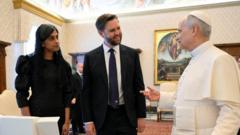Pope Leo XIV recently engaged in significant discussions with US Vice-President JD Vance, addressing collaboration on political and humanitarian fronts.
Pope Leo XIV and VP JD Vance Discuss Religious Freedom and Migration Issues

Pope Leo XIV and VP JD Vance Discuss Religious Freedom and Migration Issues
A historic meeting underlines complex relations between the Vatican and US leadership.
Pope Leo XIV has conducted a pivotal meeting with US Vice-President JD Vance, marking a noteworthy moment in US-Vatican relations. The session took place at the Vatican following Vance's attendance at the Pope's inaugural mass, where he expressed his pride in the Chicago-born leader of the Roman Catholic Church.
The Vatican issued a statement describing the talks as "cordial," underscoring a mutual satisfaction with the current diplomatic framework. Interestingly, this meeting occurred against the backdrop of previous criticisms made by Pope Leo towards Vance's administration, particularly regarding migration policies that have drawn controversy for their strictness.
During the 45-minute closed-door conversation, which also included US Secretary of State Marco Rubio, key topics such as religious freedom, the interplay between church and state, and urgent international issues were brought to the table. The discussions emphasized a shared commitment to humanitarian principles and the importance of negotiated solutions in global conflict zones.
Vance's spokesperson confirmed the discussions took place without media oversight, but positive sentiments were conveyed from both sides. Following the inaugural mass, Vance articulated his support for the pontiff's mission. "Certainly our prayers go with him as he starts this very important work," he stated, highlighting a sense of collaboration moving forward.
Historically, Pope Leo has stirred dialogue regarding immigration, having previously criticized plans for mass deportations and underscored the moral imperative of compassion, which complicates the relationship with the current US administration. This evolving dynamic showcases the intricate balance between faith and politics in contemporary discourse.




















